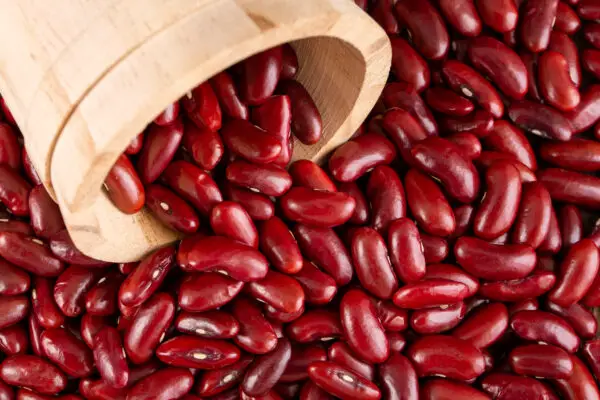Hi there! Have you ever wondered if you can freeze kidney beans after cooking them? Well, you’re in luck because, in this article, we’ll explore whether freezing kidney beans is a viable option.
We’ll discuss the benefits of freezing, the proper way to freeze them, and some useful tips to keep in mind. So, keep reading to learn all about freezing kidney beans after cooking!
Can I Freeze Kidney Beans and Baked Beans After Cooking?
Yes, you can freeze baked beans after cooking. Simply let the beans cool to room temperature, then place them in an airtight container or resealable freezer bag. Label with the date and freeze for up to 3 months. Thaw in the refrigerator before reheating.
Can You Freeze Kidney Beans After Cooking
If you’ve recently cooked up a large batch of kidney beans and find yourself with leftovers, you might be wondering if you can freeze them for later use.
Freezing cooked kidney beans is a convenient way to preserve their freshness and extend their shelf life. In this article, we will explore the process of freezing kidney beans, including proper storage methods, thawing techniques, and potential risks and considerations.
So, if you’re eager to learn how to make the most of your cooked kidney beans, keep reading!
The Shelf Life of Cooked Kidney Beans
Before delving into the freezing process, it’s important to understand the shelf life of cooked kidney beans. When stored in the refrigerator, cooked kidney beans generally stay fresh for up to 5 days. However, if you’re not planning to consume them within that timeframe, freezing is a great option to maintain their taste and texture.
Understanding the Freezing Process
Freezing kidney beans involves a simple process that helps preserve their flavor and nutritional value.
When frozen, the moisture content in the beans turns into ice crystals, which prevents the growth of bacteria and slows down the process of decay.
By freezing your cooked kidney beans, you can extend their shelf life for several months, allowing you to enjoy them at your convenience.
Proper Storage Methods
To ensure the best quality and taste, it’s important to store your cooked kidney beans properly before freezing them. Here are a few tips to follow:
- Cool the beans: Allow your cooked kidney beans to cool completely before freezing.
- Divide into portions: Divide your cooked kidney beans into small portions. This will make it easier to defrost only the amount you need for a particular meal.
- Use freezer-safe containers: Place the cooked kidney beans in airtight, freezer-safe containers or resealable plastic bags. Make sure to label them with the date to keep track of their freshness.
- Remove excess air: If using plastic bags, squeeze out any excess air before sealing them. This will help prevent freezer burn and maintain the quality of the kidney beans.
- Store in the freezer: Place the containers or bags in the coldest part of your freezer to ensure the beans freeze quickly and maintain their optimal taste and texture.
By following these storage methods, you can ensure that your cooked kidney beans retain their quality and are ready to be enjoyed whenever you need them.

Preparing Kidney Beans for Freezing
Before freezing your cooked kidney beans, it’s important to prepare them correctly to ensure the best results. Here’s what you need to do:
- Drain and rinse: Start by draining and rinsing your cooked kidney beans to remove any excess liquid or residue.
- Remove any unwanted ingredients: Check the beans for any unwanted ingredients such as herbs, spices, or seasonings that may affect the taste or texture when frozen.
- Cool the beans: Allow the beans to cool completely at room temperature before transferring them to the freezer containers.
By following these steps, you’ll set yourself up for success when it comes to freezing your kidney beans.
Freezing Cooked Kidney Beans
Now that you’ve properly prepared your kidney beans, it’s time to freeze them. Here’s how to do it:
- Divide into portions: If you haven’t done so already, divide your cooked kidney beans into small portions for easier defrosting later on.
- Pack them tightly: Fill the freezer containers or bags with the kidney beans, leaving some space at the top to allow for expansion during freezing.
- Seal the containers: If using containers, make sure they are sealed tightly. If using plastic bags, squeeze out any excess air and seal them securely.
- Label and date: Don’t forget to label each container or bag with the date of freezing. This will help you keep track of their freshness in the freezer.
By following these steps, you can freeze your cooked kidney beans properly and ensure that they maintain their quality during storage.
Thawing and Using Frozen Kidney Beans
When you’re ready to use your frozen kidney beans, it’s important to thaw them properly to maintain their taste and texture. Here are two methods to consider:
- Refrigerator thawing: The safest method for thawing kidney beans is to transfer them from the freezer to the refrigerator and allow them to thaw slowly overnight. This gradual thawing process ensures even defrosting and helps maintain the beans’ quality.
- Quick thawing: If you’re in a hurry, you can also thaw the kidney beans quickly by placing them in a sealed plastic bag and submerging them in a bowl of cold water. Change the water every 30 minutes until the beans are fully thawed.
Once your kidney beans are thawed, you can use them in your favorite recipes. Whether you’re making a hearty chili, a protein-packed salad, or a flavorful bean stew, your thawed kidney beans will add a nutritious and delicious touch to your meals.
Tips for Using Frozen Kidney Beans
To make the most of your frozen kidney beans, here are a few tips to keep in mind:
- Use within 3-6 months: While cooked kidney beans can be stored in the freezer for up to a year, they are best used within 3-6 months for optimal taste and texture.
- Avoid refreezing: Once thawed, avoid refreezing kidney beans, as this can compromise their quality.
- Consider portion sizes: When freezing kidney beans, it’s a good idea to portion them according to your recipe needs. This way, you can defrost only what you need without wasting any leftovers.
By following these tips, you can ensure that your frozen kidney beans taste just as good as fresh ones when used in your meals.
Potential Risks and Considerations
While freezing kidney beans is generally safe and convenient, there are a few potential risks and considerations to keep in mind:
- Texture changes: Freezing can alter the texture of kidney beans, making them slightly softer. While this may not be noticeable in certain recipes, it’s something to be aware of.
- Increased gas: Kidney beans are notorious for causing gas and bloating in some individuals. While freezing doesn’t eliminate this issue, it doesn’t exacerbate it either.
- Quality decline over time: While frozen kidney beans can be stored for a long period, their quality can decline over time. To ensure the best taste and texture, it’s recommended to consume them within 3-6 months of freezing.
By considering these factors, you can make an informed decision about whether freezing kidney beans is the best option for you.
Alternative Preservation Methods
If you’re not keen on freezing kidney beans, there are a few alternative preservation methods to consider:
- Canning: Canning cooked kidney beans can be a great way to preserve them long-term. However, this method requires more equipment and time than freezing.
- Dehydrating: Dehydrating kidney beans removes their moisture content, extending their shelf life without the need for freezing or canning.
- Cooking smaller batches: If you find yourself frequently with leftover kidney beans, consider cooking smaller batches to reduce waste and the need for preservation.
Conclusion
In conclusion, freezing cooked kidney beans is a convenient and effective method to store your leftovers for future use.
By following proper storage methods, preparing the beans correctly, and employing suitable thawing techniques, you can enjoy the benefits of frozen kidney beans in a variety of delicious recipes.
Whether you choose to freeze, can, or dehydrate your kidney beans, it’s important to consider your specific needs and preferences.
So, the next time you find yourself with a surplus of kidney beans, don’t hesitate to freeze them and enjoy their flavor and nutritional value whenever you desire.

